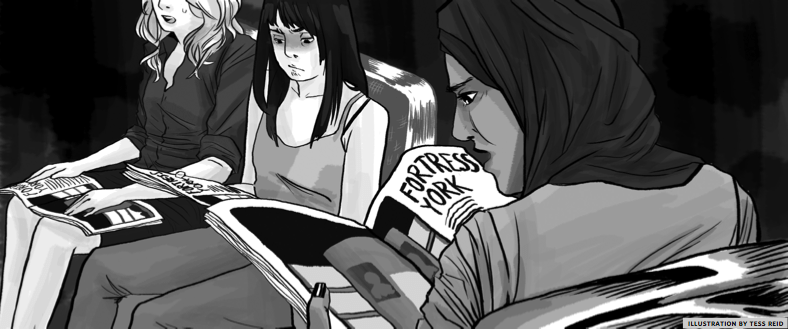
Being a journalist isn’t easy. Finding the answer to a complex problem takes approaching it with an open mind, doing months of research, and interviewing dozens of people.
The hope is you’ll come out with an in-depth understanding of the issue, present it in a balanced way, and maybe propose a solution in an article that enlightens readers. But some journalists have such a fiercely defined agenda that they stop caring about truth and objectivity completely. In the summer, I was interviewed by Katherine Laidlaw, a Toronto Life writer working on a story about sexual assaults at York. Prior to me, Leslie Armstrong, Excalibur’s former editor-in-chief was also interviewed. I had a gut feeling this wouldn’t be a fantastic piece of journalism given how the media has treated York in the past.
I’m sad to say I was right. Laidlaw took months to research this campus and interviewed a lot of people, but she presents a completely one-sided, unfair portrayal of York in her article entitled “Fortress York,” published in the October edition of Toronto Life.
The story she wants to tell is one of York as a “hunting ground for sexual predators,” where every woman is afraid for her life. To give it a human element, she introduces Austin, a female student so afraid to walk around on campus alone that she clutches onto a mini can of mace, given to her by her parents, in her pocket. There’s a vivid anecdote of the time Austin thought she was being followed by a creepy man on campus. Nothing further happened to her that evening, but a week later, writes Laidlaw, a student was beaten with a metal pipe in a spot Austin had walked through just hours before. What is Laidlaw trying to say here? Maybe I’m missing the connection here, but I don’t think there is one at all.
Then there’s the tragic story of C.C., a female student whose whole life was in shambles after she was raped by two men in 2007 at a York residence.
Before Laidlaw discloses details of the negligence lawsuit the student filed against York, she makes sure we know C.C. bled for a week after the attack, was tested for STIs, was afraid of the dark, and eventually left York for another school but had trouble keeping her grades up. C.C.’s mom took leave from work because she was suffering from anxiety and depression, writes Laidlaw, and her dad left his job because of the amount of stress the incident had put on his wife and daughter. The story hits you square in the gut. Nobody deserves to go through that trauma. But being a victim of sexual assault is a terrible experience in general, and not just for the victims of these crimes at York.
I don’t feel any less safe at York than I would anywhere else. While the administration can always do more, we have to at least give them credit for keeping us informed.
York sending out security bulletins whenever an incident happens on campus means our student body is especially conscious of every sexual assault. The fact that the media attaches “York University” to virtually anything that happens within a 30-minute walk from this campus just adds to the tension. But we’re armed with this information, and we talk about it amongst ourselves all the time.
I’m glad President Shoukri has gone on the defensive about this. We need to start demanding more from journalists.
Editor-in-Chief




